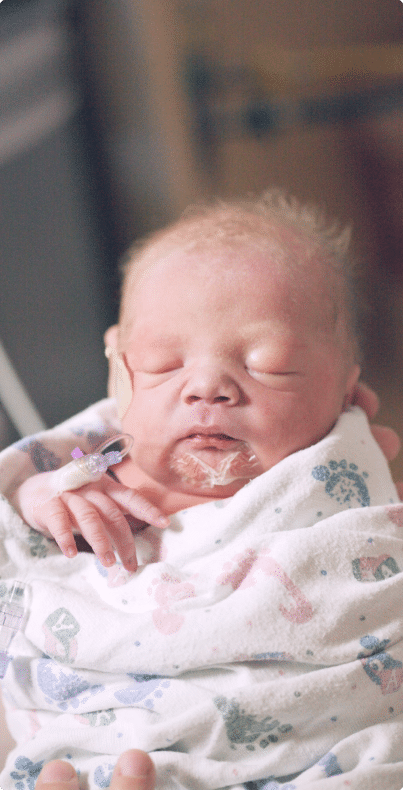Birth Asphyxia
Birth asphyxia occurs when a newborn doesn’t receive enough oxygen during childbirth due to an interruption in blood flow and/or oxygen exchange from the mother to the baby, or due to a baby not breathing adequately at birth. The long-term medical consequences for children include cerebral palsy and Erb’s palsy. While you can’t change your baby’s birth circumstances, you may recover damages if the hospital or health care team is at fault. The Birth Injury Center is here to support you. Contact us today for a free consultation.
Home > Delivery Complications > Birth Asphyxia
- Last Updated Date: November 29, 2023
What Is Birth Asphyxia?
What Are the Symptoms of Birth Asphyxia?
How Do Doctors Diagnose Birth Asphyxia Using the Apgar Test?
What Are the Stages of Birth Asphyxia?|
What Can Doctors Do To Treat Birth Asphyxia?
Can Babies Recover From Birth Asphyxia?
Support for Parents Whose Children Suffer From Birth Asphyxia
Can You File a Medical Malpractice Lawsuit for Birth Asphyxia?
What Kind of Evidence Is Necessary for a Birth Asphyxia Lawsuit?
How Long Will a Birth Asphyxia Case Take To Resolve?
What Kind of Damages Can I Receive in a Birth Asphyxia Lawsuit?
Get in Touch With a Legal Expert
Coming to terms with a newborn’s birth asphyxia is painful for all parents. Even the healthiest mothers who undergo thorough prenatal care may find their babies suffer from the complications due to birth asphyxia.
Unfortunately, you can’t change your child’s physical condition. However, you can recover financial compensation if the hospital or health care providers contributed to your baby’s condition. The Birth Injury Center is here to help you with your birth injury claim. You deserve compensation for your child’s future medical care and to cover the emotional and mental distress you have experienced. Contact us today for a free case review.
What Is Birth Asphyxia?
Birth asphyxia is an injury occurring before, during, or immediately after delivery. Babies who experience birth asphyxia suffer brain damage at birth from lack of oxygen. If the lack of oxygen continues, they may experience organ damage to the lungs, kidneys, and heart.
Birth asphyxia affects two out of every 1,000 newborns delivered in developed countries, including the United States. However, rates of birth asphyxia are 10 times higher among newborns in developing countries, especially when the mother doesn’t receive adequate prenatal and neonatal care.
Up to 20 percent of birth asphyxia cases are fatal, and 25 percent of newborns who survive suffer permanent neurological damage.
Witnessing your baby suffer from birth asphyxia can be very traumatic to parents. The birthing process has already heightened your emotions. Now, you must also deal with your baby’s immediate and unanticipated health problem. You envision holding and feeding them for the first time, not medical providers trying to stabilize their breathing.
It’s essential to seek support as you navigate this experience. Lean on family and friends, then consider exploring your legal options. The Birth Injury Center is here to assist you through the process. We provide a safe space where you can feel comfortable sharing your experience.
What Causes Birth Asphyxia?
Birth asphyxia has multiple causes, some of which occur during pregnancy. Other times, the condition arises during or shortly after childbirth. A few known causes of birth asphyxia include:
- Issues with the uterus, such as uterine rupture
- Maternal deprivation of oxygen
- Problems with the umbilical cord, such as twisting, compression, or prolapse
- Maternal breathing or respiratory issues that cut off oxygen to the baby
- Hemorrhaging during birth
Other potential causes of birth asphyxia include airway blockages and anemia. If childbirth is overly long or complicated, the chances of the newborn experiencing birth asphyxia increase.
Remember, you’re not to blame for birth asphyxia. It can happen to any parent, regardless of pre-existing health issues. The causes are beyond your control. And too often, it results from medical mistakes.
What Are the Symptoms of Birth Asphyxia?
Symptoms of birth asphyxia during birth include the following:
- Blue or gray tint to the skin
- Shallow breathing or no breathing at all
- Slow heart rate
- Poor reflex and muscle tone
- Presence of acid in the blood (tested at birth through a blood sample taken from the umbilical cord)
- Seizures
Sometimes, the mother’s amniotic fluid may contain traces of meconium, the baby’s first stool. While this can be a normal finding, it also can indicate that a baby is in distress in utero, and can lead to further breathing problems if the baby aspirates (inhales) the meconium at birth.
If you believe your health care providers are to blame for your baby’s condition, seek legal assistance from the Birth Injury Center.
How Do Doctors Diagnose Birth Asphyxia Using the Apgar Test?
Every newborn baby undergoes initial Apgar testing immediately after childbirth. The Apgar test evaluates a newborn’s general health, including heart rate, breathing, reflexes, color, and muscle tone. It’s usually administered twice: once during the minute after birth and again five minutes later.
Babies receive an Apgar score between zero and ten. Higher scores indicate good health, while scores below seven indicate problems that may require immediate care.
Babies with an Apgar score of three or lower are more likely to experience birth asphyxia. The doctor will evaluate them for signs of the condition and administer treatment if necessary.
If your baby has a low Apgar score due to birth asphyxia, try to stay positive. Perfect Apgar scores are very rare. Your baby can recover and lead a happy, healthy life with proper medical treatment.

What Are the Stages of Birth Asphyxia?
There are two stages of birth asphyxia that newborns may experience.
In the first stage, newborns experience low blood flow, and cells don’t receive the oxygen they need to support the body’s functions. This becomes apparent immediately following childbirth.
The second stage of birth asphyxia develops if they don’t respond to immediate treatment or don’t receive the care they need to recover. Newborns in the second stage of birth asphyxia may experience symptoms for days or weeks, even if the brain begins receiving the proper amount of oxygen.
Babies who experience the second stage of birth asphyxia are at higher risk of future brain damage complications or death.
It’s essential to consult with a lawyer if your baby is at risk of long-term brain damage due to birth asphyxia. You’ll likely need financial support for their future medical needs. An experienced birth injury lawyer can evaluate your case and determine whether your health care providers are responsible for your baby’s condition.
What Can Doctors Do To Treat Birth Asphyxia?
If the doctor discerns an infant has birth asphyxia, they should take action quickly.
Mild asphyxia may require breathing assistance such as a continuous positive airway pressure (CPAP) or supplemental oxygen through a face mask or nasal cannula.
The doctor will provide advanced treatment if the asphyxia is moderate to severe. Advanced treatment can include the following:
- Support from a breathing machine, tube, or a heart-lung pump
- Inducing hypothermia with a body cooling machine
- Medication to control blood pressure or seizures
- Kidney dialysis
- IV feeding to provide nutrients if there is bowel dysfunction
Doctors continue treatment until the newborn recovers from birth asphyxia.
Can Babies Recover From Birth Asphyxia?
In some cases, babies can fully recover from birth asphyxia without long-term complications. Full recovery depends on how long the newborn suffers from asphyxia as well as how quickly healthcare provider recognizes and appropriately treats the condition. Babies who don’t receive enough oxygen for extended periods are more likely to have permanent damage or succumb to their condition.
Babies with mild or moderate asphyxia can recover in days or weeks. However, babies are more likely to suffer long-term repercussions if asphyxia impacts the brain, lungs, kidneys, heart, or other organs.
What Are the Long-Term Complications for a Newborn With Birth Asphyxia?
Moderate to severe birth asphyxia increases the chances of a newborn developing neurological problems in childhood or adulthood.
Conditions associated with moderate birth asphyxia include the following:
- Hyperactivity
- Attention-deficit disorder
- Autism
- Lower intelligence quotient score
- Schizophrenia
- Development of psychotic disorders
Babies born with birth asphyxia may suffer long-term effects, including cerebral palsy, Erb’s palsy, epilepsy, and mental retardation. Every case is different, and symptoms of long-term conditions may not be immediately apparent.
Support for Parents Whose Children Suffer From Birth Asphyxia
Parents whose children suffer from conditions caused by birth injuries may feel alone. Joining a support group can help. Many groups offer assistance to parents and children suffering from the effects of birth asphyxia.
Here are a few to consider:
- The Compassionate Friends: The Compassionate Friends organization supports grieving parents after losing a child. They have online communities and local chapters that provide assistance.
- Family Voices: The Family Voices website is full of resources for families and friends of children with special needs.
- March of Dimes: March of Dimes works toward ending maternal and infant health care problems. You can find local support groups in your area through their website.

The Birth Injury Center offers many resources for parents of newborns who suffer from birth asphyxia. We genuinely care about you and your child’s experience. We are here to listen. Contact us if you have questions about birth asphyxia or need help finding a knowledgeable lawyer to handle your case.

Can You File a Medical Malpractice Lawsuit for Birth Asphyxia?
If your baby’s birth asphyxia resulted from the negligent actions of your health care providers, you can file a medical malpractice claim. You must prove you and your baby received subpar care during childbirth.
Malpractice can cause or exacerbate birth asphyxia when health care providers fail to properly monitor the baby or miss signs of something wrong.
Health care providers whose actions don’t meet the accepted standard of care may be liable. However, it will be your job to demonstrate other medical providers would take different steps, given the circumstances.
You must connect the medical provider’s actions to your newborn’s birth asphyxia. You also must quantify the financial damages from the event, including past and future medical costs.
What Kind of Evidence Is Necessary for a Birth Asphyxia Lawsuit?
Before filing a medical negligence lawsuit, your attorney at Birth Injury Center will gather substantial evidence to support your case. They’ll examine your medical records from pregnancy to childbirth and note any instances they find of substandard care.
Most birth asphyxia cases involve expert testimony from experienced medical practitioners. A knowledgeable health care provider will evaluate the treatment you and your baby received and describe how potential sub-standard care led to complications and any related conditions your newborn suffers from.
All medical negligence claims are different. Birth Injury Center will work to ensure we gather the required evidence to support your lawsuit, should you decide to pursue one.
How Long Will a Birth Asphyxia Case Take To Resolve?
It depends. Your attorney will need time to evaluate your claim and document the evidence. They might discuss your case with medical experts and gather testimony to support the claim.
Not all birth asphyxia cases go to trial. Some will end up in a settlement, where the defendant offers compensation instead of letting the court decide the outcome. If they offer a settlement, you and your lawyer will discuss the terms and whether they’re in your best interest. If you decline a settlement, the case will proceed to the courtroom.
In general, settled cases take six months to a year to resolve. Court cases may take several years to receive an outcome.
What Kind of Damages Can I Receive in a Birth Asphyxia Lawsuit?
There are two types of compensation in a medical malpractice lawsuit: economic and non-economic damages.
Economic damages include estimable costs, such as past and future medical expenses necessary to care for your child’s condition. They may also include lost wages if you cannot work because you are caring for your newborn.
Non-economic damages include emotional pain and suffering. You likely endured much mental hardship during your experience, and a lawsuit can compensate you for this. You may also recover damages for your child’s loss of enjoyment or quality of life.
A third type of compensation may be available in some birth asphyxia claims—punitive damages. Punitive damages punish the defendant if their actions were egregious. Only a judge or jury can award punitive damages.
Get in Touch With a Legal Expert
If your baby suffered oxygen deprivation at birth, you may have legal alternatives to explore. In some cases, birth asphyxia arises directly from unsatisfactory care by health care professionals during the birth process. The Birth Injury Center legal team can investigate your circumstances and determine whether you have a valid claim.
At the Birth Injury Center, our knowledgeable attorneys are well-versed in birth injuries, including birth asphyxia. We have years of experience helping parents recover compensation for their losses. Contact us today so you don’t miss out on potential compensation for your child’s injuries.
Birth Asphyxia – StatPearls – NCBI Bookshelf (nih.gov)
Birth Asphyxia: Causes, Treatment, and Outlook (healthline.com)
Birth Asphyxia – Seattle Children’s (seattlechildrens.org)
What Is the Apgar Score? – Johns Hopkins All Children’s Hospital (hopkinsallchildrens.org)
Pathophysiology of perinatal asphyxia: can we predict and improve individual outcomes? | SpringerLink
Erb’s Palsy: What Is it, Symptoms, Causes & Treatment (clevelandclinic.org)
Written by:
Birth Injury Center Team
The Birth Injury Center aims to create informational web content and guides to help women and their families seeking support and guidance for birth injuries caused by medical negligence. All of the content published across The Birth Injury Center website has been thoroughly investigated and approved by medical expert Natalie Speer, RNC-OB, Attorney Ryan Mahoney.


